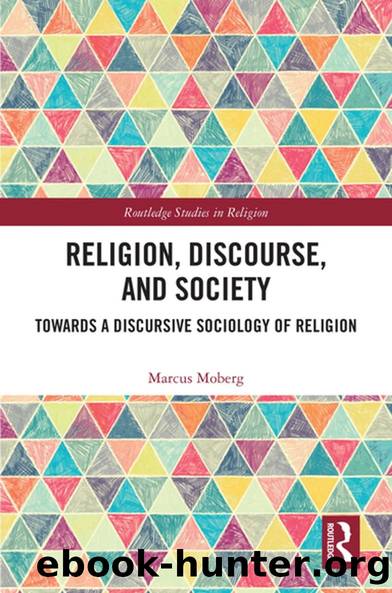Religion, Discourse, and Society by Marcus Moberg

Author:Marcus Moberg [Moberg, Marcus]
Language: eng
Format: epub
Tags: Social Science, Sociology of Religion, Religion, Comparative Religion, Media Studies, Institutions & Organizations
ISBN: 9781000530469
Google: WRhREAAAQBAJ
Barnesnoble:
Goodreads: 58839445
Publisher: Routledge
Published: 2021-12-30T03:12:05+00:00
Although contemporary liberal democratic political discourse continues to include elements of both political and economic individualism, during roughly the past century or so, social individualism has without doubt developed into the dominant form of individualism in the West.
The onset of social individualism was noted by Durkheim already at the end of the nineteenth century. In what remains a quite original take on the matter, Durkheim approached the issue of individualism in direct connection to his broader, and more fundamental, idea that all societies âcreate systems of symbolic classification to make sense of the worldâ in the form of a general distinction between the âsacredâ and the âprofane.â29 In this framework, as principally laid out in The Elementary Forms of the Religious Life (1912), the âsacredâ refers to those things, ideas, practices, phenomena, persons, etc. that members of a particular community endow with a non-contingent and non-negotiable value or character. The sacred is therefore typically circumscribed by (sometimes very elaborate) rules that stipulate how people are to engage with and treat the sacred. As Gordon Lynch phrases it, by underpinning the basic categories and values that structure communities and societies on the whole, sacred phenomena âexert a profound moral claimâ over peopleâs lives.30 This is why, in Durkheimâs view, the community itself becomes the epitome of the sacred.31 Communal constructions of the sacred are further formed in dialectical contradistinction to communal constructions of the profane, or those classes of things, ideas, phenomena, etc. that are perceived to belong to the sphere of mundane, everyday life and that therefore lack particular âspecialness.â The profane thereby also accrues a transgressive charge relative to the strength of the sacred: the stronger the sense of the sacred, the greater the revulsion evoked by that which threatens to profane or violate it. As outlined by Durkheim, the sacred is thus not be understood in terms of an ontologically fixed category. Nor does the sacredâprofane distinction refer to any type of distinction between âgoodâ and âevil.â Rather, depending from one communal context or another, virtually anything can be constructed as sacred. And so, while the sacred has indeed traditionally been closely tied to religious frameworks and typically been imbricated with religious discourses, it extends well beyond these. âReligionâ should therefore not be regarded as the âsourceâ of the sacred, while the âprofaneâ should not be confused or conflated with the category of the âsecular.â32
At different points throughout key works such as The Division of Labor in Society33 (1893) and Elementary Forms, as well as the essay âIndividualism and the Intellectualsâ (1898), Durkheim argues that, whereas âtraditionalâ society is underpinned by âthe idea it has of itselfâ as a collective,34 modern society instead becomes morally consolidated through what he refers to as the âcult of the individualâ (culte de la personne). The precise meaning of this concept, however, remains somewhat unclear. At one point, he refers to it as âindividualist faith,â at another point as the âreligion of humanity,â and at yet another point as the âreligion of the individual.
Download
This site does not store any files on its server. We only index and link to content provided by other sites. Please contact the content providers to delete copyright contents if any and email us, we'll remove relevant links or contents immediately.
The European Opportunity by Felipe Fernández-Armesto(568)
The European History Highway: A Guide to Internet Resources by Dennis A. Trinkle Scott A. Merriman(534)
Morgan Kaufmann Digital Watermarking and Steganography by Ingemar Cox Matthew Miller Jeffrey Bloom Jessica Fridrich Ton(528)
The Seven Wonders of the Ancient World by Michael Denis Higgins(518)
Hyperculture by Byung-Chul Han(502)
European Security in a Global Context by Thierry Tardy(501)
European Security without the Soviet Union by Stuart Croft Phil Williams(501)
The Routledge companion to Christian ethics by D. Stephen Long Rebekah L. Miles(496)
Get Real with Storytime by Julie Dietzel-Glair & Marianne Crandall Follis(443)
Hudud Al-'Alam 'The Regions of the World' - a Persian Geography 372 A.H. (982 AD) by V. V. Minorsky & C. E. Bosworth(436)
Gorbachev And His Generals by William C. Green(427)
Tibetan Studies in Comparative Perspective by Chih-yu Shih Yu-Wen Chen(426)
Governance, Growth and Global Leadership by Espen Moe(417)
How Languages Are Learned 5th Edition by Patsy M Lightbown;Nina Spada; & Nina Spada(406)
CliffsNotes on Fitzgerald's The Great Gatsby by Kate Maurer(398)
The Oxford History of the World by Fernández-Armesto Felipe;(388)
The Egyptian Economy, 1952-2000 by Khalid Ikram(376)
Oral Poetry and Narratives from Central Arabia: The Poetry of Ad-Dindan : A Bedouin Bard in Southern Najd (Studies in Arabic Literature, Vol 17) (English and Arabic Edition) by P. M. Kupershoek P. Marcel Kurpershoek(365)
The Oxford Handbook of the Incas by Sonia Alconini(364)
